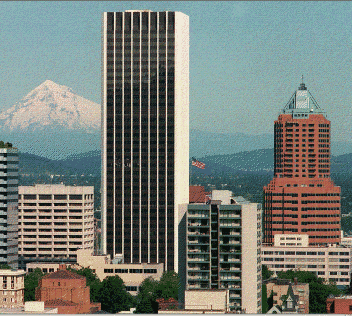 Back to The
Search for Common Ground
Back to The
Search for Common Ground

 Back to "The Search for
Common Ground"
Back to "The Search for
Common Ground"By Dee J. Hall

It doesn't take a math whiz to figure out that the plan, tentatively approved by the Metro Council last December, means some pretty high density development over the next 45 years. While the area's population of 1.3 million is expected to go up by 55 percent, just 8 percent more land would be added to the area's Urban Growth Boundary, under the plan.
Planners have learned some lessons from their first 20 years and built improvements into the new plan, said Mike Burton, the head of Metro, the regional elected government.
One problem was that after the growth boundary was drawn, development was allowed to sprawl out within it, and the land has been used up more quickly than anticipated. That and an influx of cash-rich Californians have sent home prices skyward, said John Fregonese, Region 2040 lead planner. The average Portland area home price in 1989 was 88 percent of the national average; now it's 106 percent.
As a result, Region 2040 calls for higher densities, including more townhouses, condominiums and rowhouses, and it brings pieces of land -- called urban reserves -- into the boundary only when they are needed. Understandably, building homes and businesses even closer together is one of the biggest issues on residents' minds.
A few residents at a recent Region 2040 public hearing in the Portland suburb of Milwaukie said they believe more density is needed in Clackamas County. Not everyone agreed.
Higher density ``is a bit of a windfall for developers, with no compensation for the homeowners,'' said Richard Thralls, an Oak Grove resident. ``They're saying, `We're going to double the number of people living next to you. You don't mind, do you?' ''
But Don Morissette, the Metro Council member elected with homebuilder backing, said the Portland area must plan for growth with higher densities or become a sprawling region like Los Angeles.
But is high density a fair trade to avoid sprawl? Metro planner Fregonese knows it is. When communities are allowed to sprawl, ``you lose any type of community and you lose the use of your feet'' to get places, Fregonese said.
``When you have sprawl,'' he added, ``all your resources are sucked to the edge for new roads, and schools and sewers. Then you have a lack of money for rebuilding... and you get these rotting cores.''
And there are other costs, Fregonese said, including longer commutes, rapidly disappearing open space and more air pollution. ``People here understand... they're going to pay for the sprawl, both in quality of life and taxes,'' Fregonese said. ``They're saying, `You want me to pay extra so you can live on a half-acre lot? Excuse me?' ''
Fregonese points to some older neighborhoods close to the central city as examples of what is needed. In Hawthorne, tidy homes have small yards, narrow streets, and 85 percent of middle-class residents take the bus to shop or work, he said. Fregonese is looking for a house in this neighborhood.
Some of the new housing for the burgeoning population will be provided along the scenic Willamette River, which slices through the middle of the central city and carries everything from ocean-going ships to sailboats.
Townhomes at 50 to 100 units an acre are going up along the river within walking distance of downtown, which boasts microbreweries, shops, restaurants and an incredible number of coffee shops. (One lingering mystery: How do so many Portlanders have the time to hang out at coffee shops in the middle of a work day?)
As a way to boost density, for example, planners hope to double or triple the number of townhouses from the current 4 percent of the market. Jon Chandler, an attorney with the Home Builders Association of Metropolitan Portland, said it's a fine goal; he's just not sure people will buy more townhouses.
``Our concern with 2040 is that all kinds of things work on paper. But they have to work when they're built,'' Chandler said. ``That's the biggest conflict is to get the planners to look at the marketplace. Planners like to ignore the market, because it's unhandy.''
But Fregonese said part of the problem is that homeowners haven't been given many options to the standard single-family subdivision -- and city ordinances have practically mandated suburban style development. ``People think that everyone wants to live on a half-acre lot,'' Fregonese said. ``But you don't know what the options are unless you see it. That's like my grandpa couldn't know in 1962 that he'd want... a Cavalier instead of a 1962 Impala. By and large, builders are still building 1962 Impalas.''
Region 2040 also plans for high density at transit stops along the MAX (Metropolitan Area Express) light-rail lines. The system currently consists of one, 15-mile line stretching from the central city east to the suburb of Gresham and carrying 28,000 people a day.
But work is under way to extend the line another 18 miles in the other direction toward the suburb of Hillsboro. Eventually, the MAX system is planned to serve the northern and southern portions of the region as well.
When it was built in 1986, the system cost $214 million. The second phase, currently under construction, is expected to cost $800 million to $900 million.
Tri-Met, the agency that operates MAX, estimates the light-rail system has boosted the downtown and spawned $1.2 billion in new development and redevelopment, including a convention center and an arena (privately financed) for the Portland Trail Blazers.
Said Fregonese: ``It (light rail) is not worth the cost if you're just looking at transit. It's a way to develop your community at higher densities.''
Printed Sunday, July 23, 1995.
 Back to The
Search for Common Ground
Back to The
Search for Common Ground